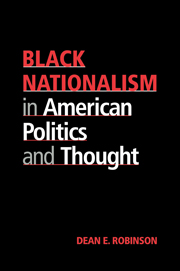Book contents
- Frontmatter
- Contents
- Acknowledgments
- Introduction
- 1 Anglo-African Nationalism
- 2 Malcolm X and the Nation of Islam
- 3 Black Nationalist Organizations in the Civil Rights Era
- 4 Black Nationalist Discourse
- 5 Black Nationalism as Ethnic Pluralism
- 6 Black Nationalism and the Ethnic Paradigm
- 7 Black Nationalism in the Contemporary Era
- Notes
- Selected Bibliography
- Index
Introduction
Published online by Cambridge University Press: 12 January 2010
- Frontmatter
- Contents
- Acknowledgments
- Introduction
- 1 Anglo-African Nationalism
- 2 Malcolm X and the Nation of Islam
- 3 Black Nationalist Organizations in the Civil Rights Era
- 4 Black Nationalist Discourse
- 5 Black Nationalism as Ethnic Pluralism
- 6 Black Nationalism and the Ethnic Paradigm
- 7 Black Nationalism in the Contemporary Era
- Notes
- Selected Bibliography
- Index
Summary
Over the course of political history in the United States, black nationalism has appeared in a number of guises. During the mid nineteenth century, under the looming shadow of the Fugitive Slave Act of 1850, Martin Delany, James T. Holly, and others argued that black people should relocate to the Caribbean, Central America, Canada, or Africa in order to establish an “African nationality.” During the early 1920s, Marcus Garvey urged his followers to do the same. Dressed in military garb, topped with helmet and plume, he told black people to reject white propaganda, resettle to Africa, and redeem the race. Building partly on Garvey's legacy, in the 1960s Malcolm X also encouraged black people to separate, on the grounds that integration meant conforming to the roles and status demanded by whites in America. And Malcolm X's one-time rival and the current head of the Nation of Islam, Louis Farrakhan, offers the most visible example of an old posture. Self-determination. Reclaiming one's roots and identity. Manhood and esteem. These are the ideas that have been manifested in black nationalist movements, past and present.
But, in terms of politics, black nationalism's militant rejection of things American and European is not its most vital political feature. It hasn't always done that. As Wilson Moses has persuasively argued, nationalists before 1925 or so were assimilationists – they embraced Western culture. Nor is patriarchy black nationalism's most vital feature. This is a common, if not universal, characteristic of all kinds of nationalism. Nor is it, as Moses suggests, its messianic quality. All nationalism is, as Anderson notes, inherently quasi-religious.
- Type
- Chapter
- Information
- Publisher: Cambridge University PressPrint publication year: 2001

